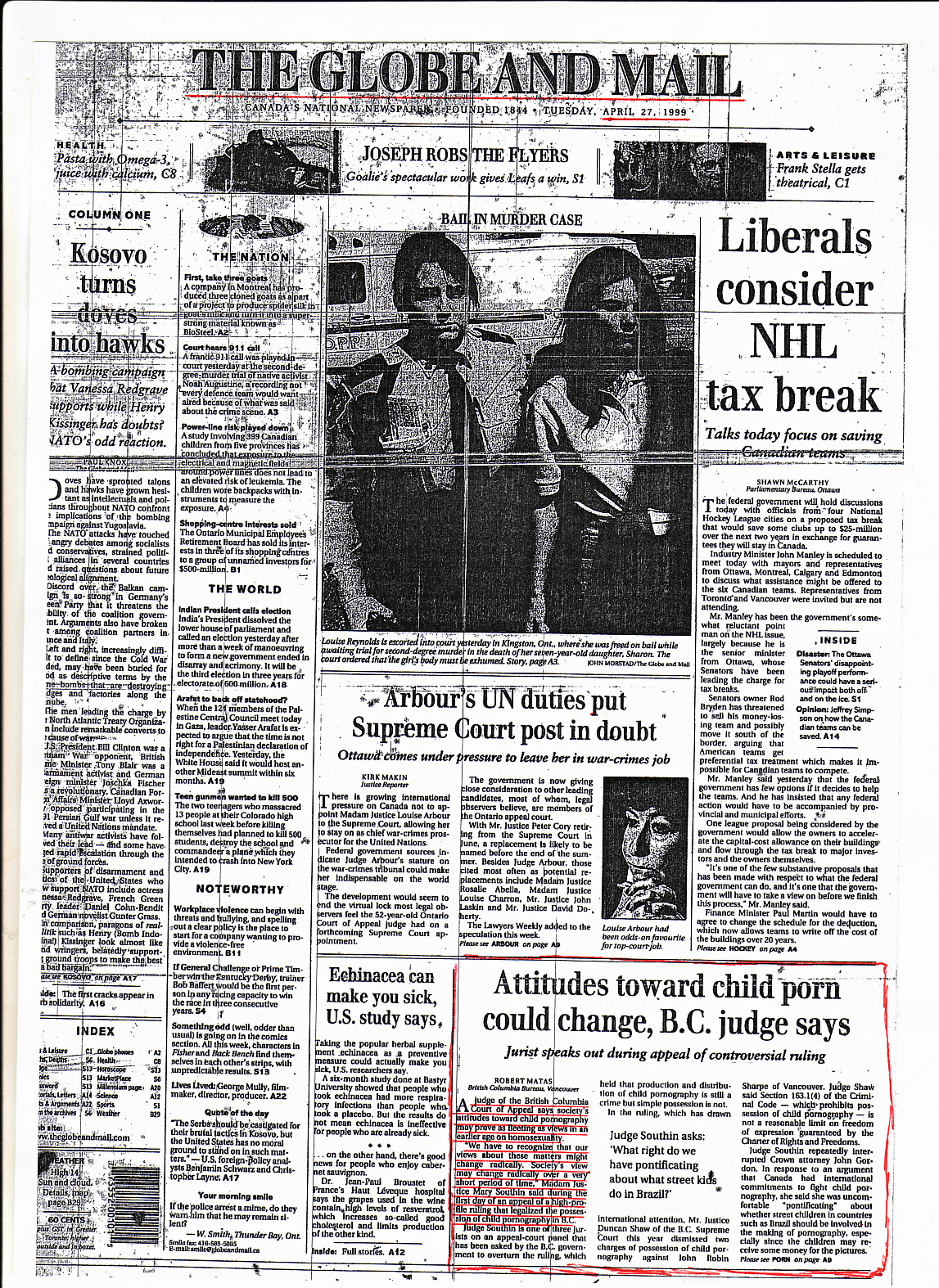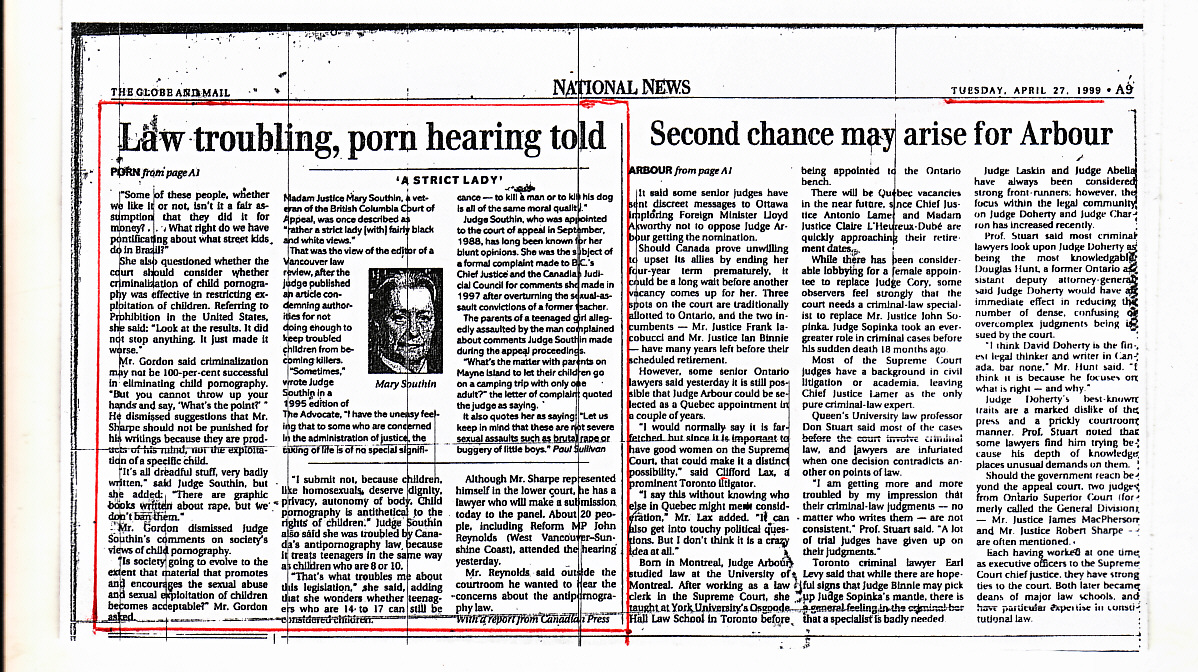


ROBERT MATAS
British Columbia bureau, Vancouver
A judge of the British Columbia Court of Appeal says society's attitudes toward child pornography may prove as fleeting as views in an earlier age on homosexuality.
"We have to recognize that our views about these matters might change radically. Society's view may change radically over a very short period of time," Madam Justice Mary Southin said during the first day of an appeal of a high-profile ruling that legalized the possession of child pornography in B.C.*
Judge Southin is one of three jurists on an appeal-court panel that has been asked by the B.C. government to overturn the ruling, which held that production and distribution of child pornography is still a crime but simple possession is not.
In the ruling, which has drawn
international attention, Mr. Justice Duncan Shaw of the B.C. Supreme Court this year dismissed two charges of possession of child pornography against John Robin Sharpe of Vancouver. Judge Shaw said Section 163.1(4) of the Criminal Code--which prohibits possession of child pornography--is not a reasonable limit on freedom of expression guaranteed by the Charter of Rights and Freedoms.
Judge Southin repeatedly interrupted Crown attorney John Gordon. In response to an argument that Canada had international commitments to fight child pornography, she said she was uncomfortable "pontificating" about whether street children in countries such as Brazil should be involved in the making of pornography, especially since the children may receive some money for the pictures.
PORN from page A1
"Some of these people, whether we like it or not, isn't it a fair assumption that they did it for money?...What right do we have pontificating about what street kids do in Brazil?"
She also questioned whether the court should consider whether criminalization of child pornography was effective in restricting exploitation of children. Referring to Prohibition in the United States, she said: "Look at the results. It did not stop anything. It just made it worse."
Mr. Gordon said criminalization may not be 100-per-cent successful in eliminating child pornography. "But you cannot throw up your hands and say,'What's the point?'" He dismissed suggestions that Mr. Sharpe should not be punished for his writings because they are products of his mind, not the exploitation of a specific child.
"It's all dreadful stuff, very badly written," said Judge Southin, but she added: "There are graphic books written about rape, but we don't ban them."
Mr. Gordon dismissed Judge Southin's comments on society's views of child pornography.
'A STRICT LADY'
Madam Justice Mary Southin, a veteran of the British Columbia Court of Appeal, was once described as "rather a strict lady [with] fairly black and white views."
That was the view of the editor of a Vancouver law review, after the judge published an article condemning authorities for not doing enough to keep troubled children from becoming killers.
"Sometimes," wrote Judge Southin in a 1995 edition of The Advocate, "I have the uneasy feeling that to some who are concerned in the administration of justice, the taking of life is of no special significance--to kill a man or to kill his dog is all of the same moral quality."
Judge Southin, who was appointed to the court of appeal in September, 1988, has long been known for her blunt opinions. She was the subject of a formal complaint made to B.C.'s Chief Justice and the Canadian Judicial Council for comments she made in 1997 after overturning the sexual-assault convictions of a former teacher.
The parents of a teenaged girl allegedly assaulted by the man complained about comments Judge Southin made during the appeal proceedings.
"What's the matter with parents on Mayne Island to let their children go on a camping trip with only one adult?" the letter of complaint quoted the judge as saying.
It also quotes her as saying: "Let us keep in mind that these are not severe sexual assaults such as brutal rape or buggery of little boys." Paul Sullivan
(biography accompanied by photograph of Mary Southin, captioned:
Mary Southin)
"Is society going to evolve to the extent that material that promotes and encourages the sexual abuse and sexual exploitation of children becomes acceptable?" Mr. Gordon asked.
"I submit not, because children, like homosexuals, deserve dignity, privacy, autonomy of body. Child pornography is antithetical to the rights of children." Judge Southin also said she was troubled by Canada's antipornography law because it treats teenagers in the same way as children who are 8 or 10.
"That's what troubles me about this legislation," she said, adding that she wonders whether teenagers who are 14 to 17 can still be considered children.
Mr. Sharpe, accompanied by a friend, sat in the centre of the public gallery during the appeal proceedings, occasionally taking notes on a legal pad. He said outside the courtroom he felt he was doing a public service by challenging the law. "It's a bad law. Someone had to attack it," he said.
Although Mr. Sharpe represented himself in the lower court, he has a lawyer who will make a submission today to the panel. About 20 people, including Reform MP John Reynolds (West Vancouver-Sunshine Coast), attended the hearing yesterday.
Mr. Reynolds said outside the courtroom he wanted to hear the concerns about the antipornography law. "If the law is not good enough to prevent Sharpe from having the material he has, then we have to change the law to make sure it is," he said.
With a report from Canadian Press
(text of April 27, 1999 Globe and Mail front-page article)
![]() *-FOR A PERSPECTIVE ON THIS SUBJECT OF "SOCIETY'S ATTITUDES" AND WHAT MAY CAUSE THEM TO CHANGE,
TAKE YOUR NEXT FOOTSTEP HERE .
*-FOR A PERSPECTIVE ON THIS SUBJECT OF "SOCIETY'S ATTITUDES" AND WHAT MAY CAUSE THEM TO CHANGE,
TAKE YOUR NEXT FOOTSTEP HERE .